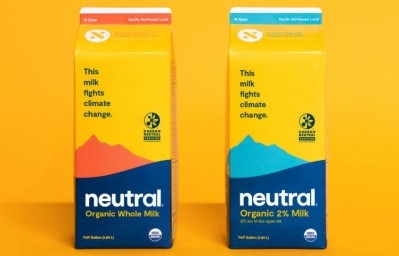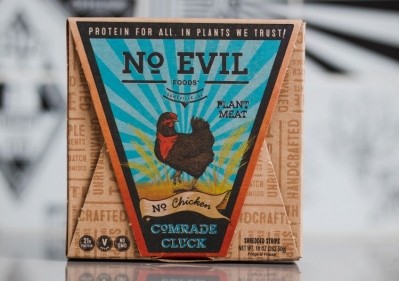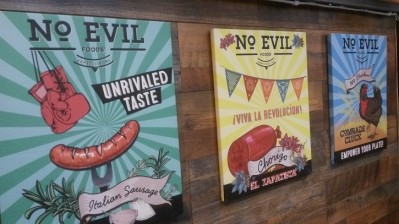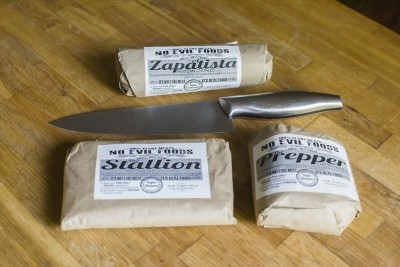Plastic or paper? No Evil Foods examines which is more sustainable & finds a surprising answer that spurred a packaging refresh to complement new products
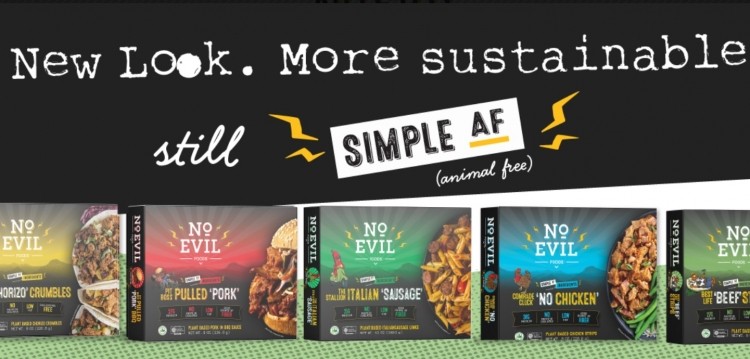
But, as company co-founder Sadrah Schadel explained to FoodNavigator-USA at Natural Products Expo West in Anaheim last week, the new packaging actually is a more sustainable approach for the company, based on a lifecycle analysis the company conducted.
“That the packaging is no longer compostable, that’s a really big change for us. But ... what we though was the more sustainable substance, as we did a lifecycle analysis of our products, we realized was not. So, we almost bought into the greenwashing ourselves! And then we realized, wait a second, [compostable] is not the most sustainable option,” Schadel said.
She explained that while compostable packaging is appealing because in theory it reduces landfill waste, the reality is most parts of the US don’t offer industrial composting services and, if compostable packaging is mishandled, it might not breakdown as intended, it could release methane gas, and it could contaminate other recyclable products.
No Evil Foods’ new packaging uses Sustainable Forestry Initiative certified sustainable paperboard and uses 100% renewable wind-powered, all plant-based inks and adhesives, which together allowed the company to cut its greenhouse gas emissions by more than 80% compared to the compostable packaging, Schadel said.
Selecting a plastic was more difficult, admits Schadel, who said she was “chasing my tail in circles figuring out do I use plastic? Do I use virgin plastic? Do I use recycled plastic? Do I use recyclable plastic? Do I use bio-based plastic?”
She also considered which type of plastic would offer the necessary protective barrier for the company’s foods, has a stable manufacturing supply chain and runs on the company’s existing manufacturing machinery.
To offset the impact of the company’s decision to use plastic, Schadel said she opted for one that is plastic negative certified, which requires the removal and recovery of 200% of the plastics No Evil Foods uses in its packaging through rePurposed Global – an organization that helps individuals and companies offset their footprint.
Schadel said she also was drawn to rePurposed Global as a partner because it works to move marginalized waste workers that scavenge into formal waste working positions with living wages, and because it develops waste management infrastructure in countries that receive the waste of industrialized countries.
Photos are worth a million words
The new packaging not only lowers the company’s impact, but it gives it a substantially larger format and presence on shelf, which Schadel said No Evil Foods is leveraging with dynamic new imagery and bolder claim callouts.
Unlike the old packaging, which relied on quirky illustrations, the new packaging features photos of the plated products, which Schadel said will help more quickly communicate to consumers what the product is and how to use it.
“One of the things we noticed during COVID … is people weren’t spending time in the grocery store. They were going in, they were going out, they were looking for exactly what it was they wanted and then getting out again. They weren’t browsing. And so without packaging photography on products, I felt like a lot of consumers were left without a clear understanding of what it was at a glance,” Schadel said.
This was particularly true for ecommerce, where food photography is essential for communicating a product’s texture and value proposition, she said.
The new packaging also elevates nutritional callouts that are unique for No Evil Foods, including the protein content and that it doesn’t use protein isolates, which is rare in the plant-based meat category. Other callouts include low-fat and that most of the products do not contain added oils, she said.
Finally, the new pack also highlights the company’s certifications as plant-based and plastic-negative.
New products take No Evil Foods into new category
In addition to debuting a new look at Natural Products Expo West, No Evil Foods also introduced its first plant-based beef products.
“We have beef strips that are coming to market nationwide next month .. .and what we wanted do with beef was really provide an alternative to all the other plant-based meat that is out there that comes in a very similar format,” Schadel said.
She explained that while many companies offer plant-based beef, most products come as burgers, grounds and meatballs.
“We’ve always been a brand that’s tried to give the consumer as much choice in their eating and their ingredients as possible, and so with beef strips we are giving a new flavor and functional format,” she said.
The product is made from a combination of wheat and chickpeas, which also meets growing demand for blended proteins and allows the company to offer a complete protein, she added.
The launch comes at a time when sales of refrigerated plant-based beef have been falling, which Schadel contributes in part to consumers wanting healthier options than some of the high-profile offerings available and because several brands that entered the category at its peak failed to perform.
“I think with our products, consumers are going to find what they’re looking for in the plant-based meats space, because they’re going to find the flavor and function that reflects how they’re already cooking.
“And, if they are looking for healthier options – because a lot of people come to plant-based meat because they want to lower their saturated fat intake -- the options that are out there are not going to meet those needs because the saturated fat is still too high. Whereas our products are going to offer an alternative that meets those nutritional requirements as well as the way Americans eat at home, which is not a burger every day,” she said.
In addition to the beef strips, No Evil Foods extended to existing lines with the addition of a Chimichurri Citrus Herb Marinated Chicken, which functions as a center of the plate protein, and roasted pineapple and chili pork that comes in sauce and is easy for tacos, burritos and macro bowls.
